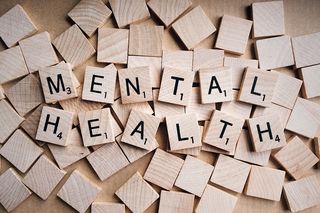Health
The Catastrophic Effects of Mental Health Stigma
Transforming a broken system.
Posted May 25, 2017 Reviewed by Ekua Hagan

Some people insist stigma around mental health is no longer an issue in our society, and mental illness no longer a taboo topic. Those having this mindset likely don’t live in a community where asking for help means potential ostracization, or come from a cultural background in which seeking psychological help is deemed as weakness, or have not had the unfortunate experience of being denied access to care due to subpar mental health benefits. In simple terms, to be of this mindset is to be privileged.
While going to therapy and taking psychotropic medication is largely accepted in metropolitan cities like New York and Los Angeles, the same cannot be said for many other parts of the country, nor for many parts of the world.
According to Mental Health America (MHA), 43.7 million Americans struggle with a mental health conditions annually. One out of five of these individuals will not receive the treatment they need. There are many reasons for the gap in care, but stigma and discrimination fall high on that list.
“Many people feel shame about seeking help,” says psychology professor Bethany Teachman. “The impact of stigma is tragic because mental health challenges are actually very common, and we have good treatments.”
According to Teachman, stigma leads to discrimination in housing, employment, and education. “Stigma against persons with mental illness remains so insidious that the National Academies of Sciences, Engineering, and Medicine put out a report this year calling for a national, evidence-based strategy to counter stigma,” she said.
How did we get here?
“Society has always viewed mental illness as a sign of weakness. Despite how much we have discovered about how the brain works in the last 50 years, stigma still persists,” says Marina Olson, who works with MakeitOk.org, an initiative to combat stigma by educating the public about mental health and encouraging people to talk about it.
“In many pockets of America, mental health is a cultural taboo,” says psychologist Anjhula Mya Singh Bais. “Asian Americans in particular find a lot of shame and equate mental health issues with failure.” The same holds true among many other cultures.
According to Quentin Vennie, author of Strong in the Broken Places: A Memoir of Addiction and Redemption Through Wellness, one of the greatest stigmas affecting the black community is the belief that having a mental health disorder constitutes weakness. His hope is to break barriers and end the stigma behind seeking help. “Mental health is not a race, religion or gender issue—it’s a humanity issue, and it’s my aim to help bring the focus to treating it on a human level.”
The media
“You probably know someone with a mental health problem and don’t even realize it,” says Silvia M. Dutchevici, MA, LCSW, president and founder of the Critical Therapy Center, “because many people with mental health problems are highly active and productive members of our communities.”
Despite the myth that people with a mental illness are more likely to be violent, research shows this is not the case. In fact, according to the U.S. Department of Health and Human Services website, those with severe mental illnesses are over 10 times more likely to be the victims of violence than the general population.
“Unfortunately, the media and politicians are not helping in eliminating the stigma around mental health,” Dutchevici says. “As language shapes our understanding of reality, when we hear media and politicians using terms associated with mental illness when a tragedy happens, it is no wonder we still fear mental illness.”
Since we are a society so attached to the media, why not take advantage of the opportunity to educate people and to challenge false messages rather than perpetuate them? Instead of portraying those with mental illnesses as dangerous, perhaps portray them like you or me, as no one is immune to mental illness.
Justice system reform
“People suffering from serious mental illness are at a 10-times higher risk of being incarcerated versus being committed to a psychiatric hospital,” says Francis Greenburger, founder of the Greenburger Center for Social and Criminal Justice. According to Greenburger:
There has been a neglect or unwillingness of the political system to acknowledge or legitimize mental illness and to create appropriate conditions for its treatment. Stigma not only denies the individual the ability to gain support and sympathy from others in the same way physical illness does, but permits government to turn its back on mental illness and determine that it is not a serious problem that affects people’s behavior. Instead of treating people who act out as a result of their disease, they incarcerate them and throw away the key.
“Stigma, ignorance and the refusal to put mental illness on par with physical illness is at the root of why the United States has criminalized a disease,” says Cheryl Roberts, executive director of the center. “We are working to provide an alternative to incarceration for those who have been criminalized for having untreated mental illness. The aim is to provide treatment not punishment, save lives and taxpayer funds, and make communities safer.”
Healthcare reform
Sadly, affordable and quality treatment for mental health in the U.S. continues to remain under par. One factor to blame is our broken health care system.
“If we talk about mental health, we also have to analyze the way insurance companies—the gatekeepers—discriminate against services,” says Dutchevici. “Insurance companies are often more eager to cover medication than talk therapy, [but] we know that medication alone does not work in most cases. Worse, in some cases, insurance companies decide to terminate payment for treatment based on the amount of session or time rather than the patient’s well-being.”
The 2008 Mental Health Parity and Addiction Equity Act (MHPAEA) is a federal law that prevents group health plans and health insurance issuers from imposing less favorable benefit limitations on mental health and substance use disorder benefits than on medical/surgical benefits. This was amended in 2010 by the Affordable Care Act (ACA) to also include individual health plans. Both were significant steps toward dismantling the historical treatment of mental health as inferior but are now at risk of being eliminated in the repeal and replacement of the ACA. What message will that send?
"We are really worried about its implications for people living with mental illness and addiction issues," said Chuck Ingoglia, senior vice president of public policy at the National Council for Behavioral Health.
The Treatment Advocacy Center is encouraging policymakers to recognize that all decisions about health reform must consider and provide for the needs of the most severely mentally ill. According to the center, “failure to do so will forfeit the momentum towards reforming our broken mental health system at tremendous human and financial cost."
The federal enforcement of mental health parity to the full extent of the law across all health plans should be the next step. If mental health providers were reimbursed on an equitable scale, perhaps plans would maintain good providers and those seeking help would have access to affordable and effective treatment.
A model of integration
Dr. Rick Donlon is co-founder of Resurrection Health, a family of clinics integrating behavioral and primary health care under the same roof. In this model, a patient’s primary care doctor and psychologist share information and make joint treatment decisions. “Since integrated care is under one roof, no one in the waiting room knows whether a patient is getting a flu shot or being evaluated for bipolar disorder, removing the stigma of being treated for mental health,” says Donlon.
“Consider how widely available integrated primary care and behavioral health services might reduce homelessness, crime and the cost of imprisoning people who just need proper care!”
Medical education reform
According to Chief Medical Officer of Health Share of Oregon Maggie Bennington-Davis, MD, MMM, stigma is not only pervasive among the general public, but it is also alive and well among health care providers and the medical education system:
Today, we are seeing a cycle of ignorance where providers may not ask their patients about their mental health, for a variety of reasons: they might be afraid of encountering an issue they aren’t equipped to handle, or simply don’t feel comfortable asking … as a result, patients’ bodies and minds are treated as separate entities. This goes against all medical understanding — that all parts of the body are connected and impact the health of one another. And yet, treatment for mental illness sometimes fails at the provider level because it is stigmatized. Medical schools also fall short in teaching future physicians how to ask or even think about mental health, much less how to respond. This is where real change in destigmatizing mental illness needs to start, as we begin to put our knowledge in the hands of our future healers. Not only do we need to reinforce the mind/body connections—we also need to eliminate the fear of treating mental illness.
According to Teachman, it is important to recognize that stigma can be expressed in many different ways, including in what she refers to as our “implicit attitudes.” She goes on to say, “In addition to acts of discrimination or intentionally making derogatory comments, people may also hold negative attitudes toward persons with mental illness that arise automatically, even outside their conscious control.”
It is essential that we become honest with ourselves, especially those of us in the mental health profession, to ensure that we, too, are not unknowingly perpetuating these negative attitudes.
Speaking out
Ruchi Dhami, director of market research and development at Recovery Brands, believes that stigma may be the single most important issue the behavioral healthcare industry is facing.
“Speaking out is what we need most. We’ve all seen the power of a voice, especially from the likes of Demi Lovato, Brad Pitt or Kristin Bell. Suddenly, society isn’t so afraid to talk about the subject and other individuals have the confidence to stand up and say, ‘I struggle with this too.’ It gives hope, and more than that it shows us that mental illness and addiction can affect anyone.”
Helga Luest is a trauma expert and senior manager at ABT Associates, where she manages evidence-based communication programs that address behavioral health issues, including stigma, at the individual, community and national levels.
A perfect example of her work is a recent video she put together after SAMHSA’s National Children's Mental Health Awareness Day, in which Olympians Michael Phelps and Allison Schmitt share their personal struggles with mental illness. They also share their thoughts on depression, isolation and the power of peer support and friendship.
“When someone is struggling,” says Luest, “hearing how others worked through their similar circumstance gives them something to relate to. There’s connection, understanding, and hope—and in that place of hope comes healing.”
A parent’s worst nightmare
Former Boston Red Sox pitcher John Trautwein and his wife, Susie, are the founders of The Will To Live Foundation, a nonprofit whose mission is to spread awareness around teen suicide and the stigma of mental health. They founded the organization after losing their 15-year-old son, Will, to suicide. “Will to Live foundation teaches kids that it’s ‘OK to not be OK’,” says Trautwein. “I never said that to my son Will when he was alive, because I never realized it.
According to Trautwein, the best way to normalize mental illness is to talk about it. “The general public is uneducated about mental illnesses—that it’s treatable, curable, common, and okay. Before my son died, no one ever talked to me about [mental illness], and I truly wish they had.”
Chrisa Hickey is a mental health advocate and the mother of a young adult son living with childhood-onset schizophrenia. Like many parents of children with severe mental illness, Hickey often faces stigmatization. She suggests that to help reduce the stigma of mental illness, we stop using slang terms as adjectives.
“Weather isn’t bipolar,” she says. “Politics aren’t schizophrenic. It seems minor, but using these clinical terms in this way reinforces the stigma of what having these illnesses means.”
She also suggests reaching out to neighbors and friends who may be struggling. “Mental illness isn’t a ‘casserole disease,’” she says. “While communities rally around families caring for a loved one with cancer or some other physical illness, families with a loved one in psychiatric treatment are often met with avoidance. Isolation and shame make it much harder to recover. Pick up the phone and ask what you can do to help.”
By keeping the conversation going, by continuing to share stories and thus “normalizing” mental health issues, perhaps more and more individuals will be inspired to share their stories. Eventually, this could lead to the slow deterioration of any remnants of shame that may remain in the minds of those who struggle with mental health conditions, as well as in the minds of those around them—including those at the highest levels in our nation.
To learn about implicit attitudes tied to mental illness and its stigma and even take a test to assess your own stigma, visit Project Implicit Mental Health.




